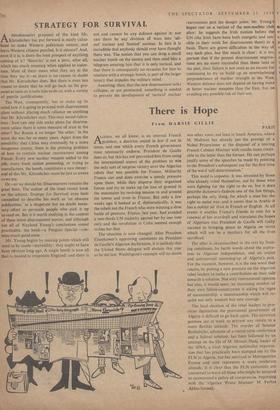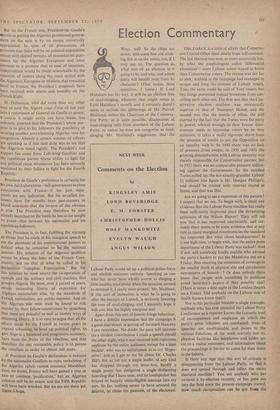There is Hope
From DARSIE GILLIE PARIS
AGERIA, we all know, is an internal French problem, a doctrine sound in law if not in sense, and one which every French government must necessarily endorse. President de Gaulle does so, but this has not prevented him from using the international aspect of the problem to win the only sort of surprise victory over the Algerian rebels that was possible for France. Militarily France can and does exercise a steady pressure upon them, while they disperse their organised forces and try to make up for loss of ground in the mountains by reviving tension in and around the towns and even in France. But only a few weeks ago it looked as if, diplomatically, it was the rebels not the French who were winning a slow battle of pressure. France, last year, had avoided a two-thirds UN majority against her by one vote only and the revolution in Cuba seemed enough to lose her that.
The situation is now changed. After President Eisenhower's approving comments on President de Gaulle's Algerian declaration, it is unlikely that the United States delegate will abstain this year as he did last. Washington's example will no doubt win other votes, not least in South America, where M. Malraux has already put the prestige of a Nobel Prizewinner at the disposal of a touring French Cabinet Minister with results more credit- able to the latter than the former. He can perhaps justify some of the speeches he made by pointing to the President's subsequent use for the first time of the word 'self-determination.'
This word is unpoetic. It was invented by those who already ruled themselves, not by those who were fighting for the right to do so, but it does describe dictionary-fashion one of the few things, perhaps the only thing, for which a man has the right to make war, and it seems that in Arabic it has a nobler air than in French or English. At all events it enables France's friends to vote for a renewal of her overdraft and stimulates the hopes of Algerians that President de Gaulle will really succeed in bringing peace to Algeria on terms which will not be a mockery for all the lives sacrificed.
The offer is circumscribed in the text by limit- ing conditions, by harsh words about the aspira- tion to Algerian independence, and an unjust and unhistorical summing-up of Algeria's past. For the moment, however, it is the one word that counts, by putting a new pressure on the Algerian rebel leaders to make a contribution on their side towards a solution. Not only international opinion but also, it would seem, an increasing number of their own fellow-countrymen is asking for signs of statesmanship, a statesmanship which will re- quire not only wisdom but rare courage.
The fatal decision of the rebel leaders to pro- claim themselves the provisional government of Algeria is difficult to go back upon. The extremist gunmen are at work to prevent any return to a more flexible attitude. The murder of Senator Benhabyles, advocate of a round-table conference and a federal solution, has been followed by an attempt on the life of M. Messali Hadj, leader of the MNA, a rival Algerian nationalist organisa- tion that has practically been stamped out by the FLN in Algeria, but has survived in Metropolitan France and now represents a more moderate attitude. It is clear that the FLN extremists arc concerned to warn all those who might be tempted to recommend a policy of compromise. beginning with the Algerian 'Prime Minister' M. Ferhat Abbas himself. But on the French side, President.de Gaulle's Success in putting the Algerian provisional govern- ment on the spot is by no means universally appreciated. In spite of all precautions, all Promises that there will be no political negotiation except with elected persons, all insistence on guar- antees for the Algerian Europeans and what amounts to a promise that in case of secession, independence would be made unworkable by the retention of centres along the coast settled with the Algerians, European or Moslem, that remained loyal to France, the President's proposals have been received with alarm and hostility on the French Right.
M. Delbecque, who did more than any other man to turn the Algiers coup dem of last year into a restoration of General de Gaulle to power, a course it might easily not have taken, has solemnly asserted. that the President's whole pur- pose is to give to his followers the possibility of securing another overwhelming Algerian vote for integration. Already a certain number of officers are speaking as if this next duty was to see that the Algerians voted rightly. The President's real §upport has come from Left-wing Gaullists and the republican parties whose ability to fight for any political cause whatsoever has been seriously Weakened by their failure to fight for the Fourth Republic.
President de Gaulle's preference is certainly for his own third alternative—self-government in close association with France—if his past state- ments are any indication. But his so-called fol- lowers have for months been past-masters in bland assertions that the reverse of the obvious IS true. The President may therefore be now already launched on the battle he has so far sought to avoid—that between his nationalist and his republican followers.
The President is, in fact, fulfilling the warning or threat that he made in his inaugural speech to use the plenitude of his constitutional powers to defend what he conceives to be the national interest. His solution of the Algerian problem Would be along the lines of the French Com- munity, not on that of what he. called in his declaration 'complete Francisation.' But for this solution he must secure the co-operation of Opinion and the military and civil machine that govcrns Algeria. He must, over a period of years, Obtain increasing liberty of expression for Algerian nationalists who, by the standards of French nationalism, are public enemies. And on the Algerian side men must be found to risk murder by their fellow-countrymen by preaching that there are peaceful as well as bloOdy ways of obtaining liberty. It is so easy to argue that all the efforts made by the French in recent years to expand schooling, to level up political rights, to Rtve Algeria a balanced and progressive economy, have been the fruits of the rebellion, and that therefore the one reasonable policy is to pursue the rebellion in order to obtain still more.
If President de Gaulle's declaration is reduced by the nationalist Gaullists to mere verbalising, if the Algerian rebels cannot renounce bloodshed, then, no doubt, France will have gained a year or two to continup 'pacification,' but an Algerian solution will be no nearer and the Fifth Republic will have been wrecked. But we are not there yet. There is hope.



































 Previous page
Previous page